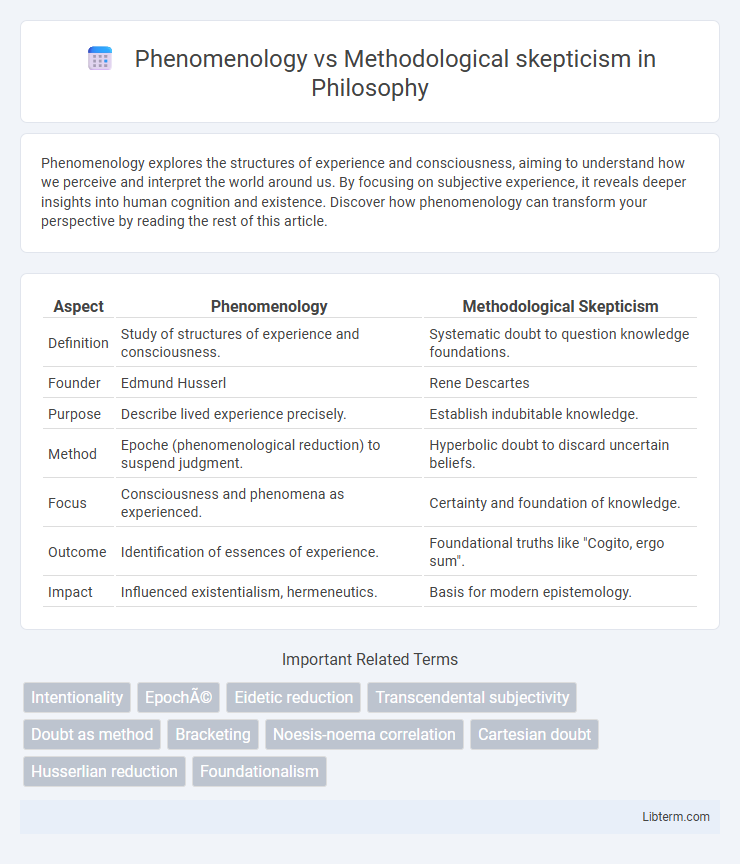Phenomenology explores the structures of experience and consciousness, aiming to understand how we perceive and interpret the world around us. By focusing on subjective experience, it reveals deeper insights into human cognition and existence. Discover how phenomenology can transform your perspective by reading the rest of this article.
Table of Comparison
| Aspect | Phenomenology | Methodological Skepticism |
|---|---|---|
| Definition | Study of structures of experience and consciousness. | Systematic doubt to question knowledge foundations. |
| Founder | Edmund Husserl | Rene Descartes |
| Purpose | Describe lived experience precisely. | Establish indubitable knowledge. |
| Method | Epoche (phenomenological reduction) to suspend judgment. | Hyperbolic doubt to discard uncertain beliefs. |
| Focus | Consciousness and phenomena as experienced. | Certainty and foundation of knowledge. |
| Outcome | Identification of essences of experience. | Foundational truths like "Cogito, ergo sum". |
| Impact | Influenced existentialism, hermeneutics. | Basis for modern epistemology. |
Introduction to Phenomenology and Methodological Skepticism
Phenomenology, founded by Edmund Husserl, emphasizes direct exploration of conscious experiences to reveal the essence of phenomena by bracketing assumptions. Methodological skepticism, most famously associated with Rene Descartes, involves systematic doubt to discard beliefs that lack absolute certainty, aiming to establish indubitable knowledge. Both approaches seek foundational clarity but differ in focus: phenomenology examines lived experience, whereas methodological skepticism prioritizes epistemic certainty through radical doubt.
Historical Origins and Philosophical Foundations
Phenomenology, founded by Edmund Husserl in the early 20th century, originates from the desire to study conscious experience directly by describing phenomena as they appear to consciousness, emphasizing intentionality and the essence of experiences. Methodological skepticism, rooted in Rene Descartes' 17th-century philosophy, systematically doubts all knowledge claims to establish indubitable foundations for scientific knowledge, prioritizing epistemic certainty through rigorous doubt. While phenomenology centers on the structures of subjective experience and meaning, methodological skepticism emphasizes epistemological rigor and the quest for absolute certainty in knowledge acquisition.
Key Figures: Husserl vs Descartes
Edmund Husserl, the founder of phenomenology, emphasized the intentionality of consciousness and the direct examination of lived experiences to uncover the essence of phenomena. Rene Descartes, a central figure in methodological skepticism, advocated for systematic doubt, questioning all beliefs to establish indubitable knowledge starting from the cogito ("I think, therefore I am"). While Husserl sought to describe experiences as they present themselves to consciousness, Descartes aimed to create a foundation for knowledge by stripping away uncertainties through radical doubt.
Core Principles of Phenomenology
Phenomenology centers on the direct investigation and description of phenomena as consciously experienced, emphasizing intentionality--the idea that consciousness is always about something. It seeks to suspend judgments about the external world through epoche, allowing pure focus on subjective experience without presuppositions. Methodological skepticism, in contrast, systematically doubts all beliefs to establish certainty, prioritizing doubt over direct experience.
Core Principles of Methodological Skepticism
Methodological skepticism centers on rigorous doubt, systematically questioning beliefs to establish certainty by discarding all that can be doubted. Its core principles include radical doubt, where no knowledge is accepted without clear and distinct evidence, and the search for indubitable truths, exemplified by Descartes' cogito argument. This approach contrasts with phenomenology's emphasis on direct experience and conscious phenomena, prioritizing foundational certainty through analytical skepticism.
Comparative Approach: Similarities and Differences
Phenomenology and methodological skepticism both explore the foundations of knowledge but differ in approach; phenomenology emphasizes direct experience and the intentionality of consciousness, while methodological skepticism involves systematic doubt to suspend belief until certainty is achieved. Both methods share a focus on critical reflection and aim to reveal underlying structures of experience or knowledge, yet phenomenology seeks to describe phenomena as they present themselves, whereas methodological skepticism rigorously questions beliefs to eliminate uncertainty. This comparative approach highlights phenomenology's descriptive nature contrasted with skepticism's analytical rigor, providing distinct pathways to understanding the nature of reality and knowledge.
Applications in Epistemology
Phenomenology in epistemology emphasizes the direct exploration of conscious experience to uncover the structures of knowledge and intentionality, facilitating a deeper understanding of how phenomena present themselves to the mind. Methodological skepticism rigorously questions the certainty of all knowledge claims by systematically doubting premises to establish indubitable foundations for knowledge. Applications in epistemology leverage phenomenology to analyze subjective experience and intentionality, while methodological skepticism underpins critical scrutiny and foundational certainty in knowledge acquisition.
Impact on Modern Philosophy
Phenomenology, pioneered by Edmund Husserl, revolutionized modern philosophy by emphasizing direct experience and intentionality, fundamentally reshaping notions of consciousness and reality. Methodological skepticism, rooted in Descartes' systematic doubt, profoundly influenced epistemology by challenging the certainty of knowledge and fostering rigorous analytical inquiry. The contrast between phenomenology's focus on lived experience and methodological skepticism's focus on doubt catalyzed diverse philosophical methodologies that define contemporary debates in metaphysics and epistemology.
Criticisms and Debates
Phenomenology faces criticism for its subjectivity and reliance on first-person experience, leading to debates about its scientific rigor and potential for bias. Methodological skepticism is challenged for potentially leading to radical doubt or solipsism, causing disputes over its practical applicability in attaining true knowledge. Both approaches evoke ongoing discussions regarding epistemological limits and the balance between skepticism and lived experience in philosophy.
Conclusion: Relevance in Contemporary Thought
Phenomenology emphasizes direct experience and the subjective structures of consciousness, offering a rich framework for understanding human perception and meaning-making. Methodological skepticism challenges assumptions through systematic doubt, fostering critical inquiry and epistemic rigor. Contemporary thought benefits from integrating phenomenology's depth of lived experience with skepticism's demand for justification, enriching philosophical and scientific methodologies alike.
Phenomenology Infographic

 libterm.com
libterm.com